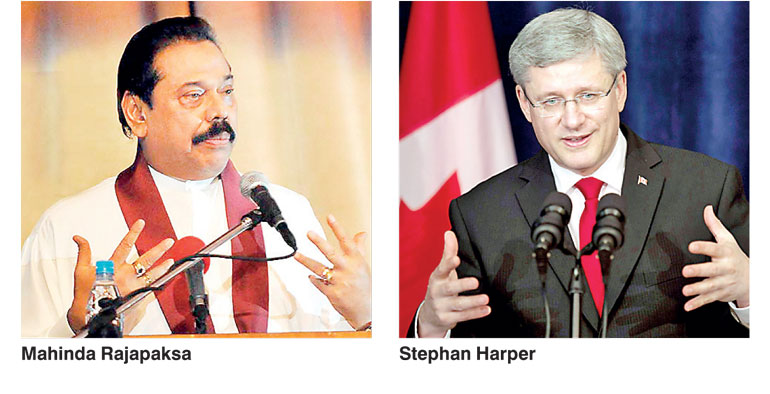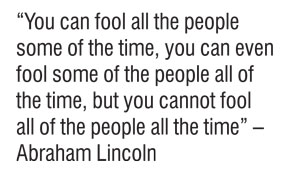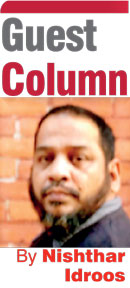Sunday Feb 22, 2026
Sunday Feb 22, 2026
Monday, 26 October 2015 00:00 - - {{hitsCtrl.values.hits}}

 Abraham Lincoln, the 16th President of the United States. History looks at this colossus with awe. A personification of supreme sagacity. Many are the wise cracks attributed to him. On democracy he famously said “is the government of the people, by the people for the people”. How many of today’s leaders truly believe and practice democracy this way? He also said “nearly all men can stand adversity, but if you want to test a man’s character, give him power”.
Abraham Lincoln, the 16th President of the United States. History looks at this colossus with awe. A personification of supreme sagacity. Many are the wise cracks attributed to him. On democracy he famously said “is the government of the people, by the people for the people”. How many of today’s leaders truly believe and practice democracy this way? He also said “nearly all men can stand adversity, but if you want to test a man’s character, give him power”.
It may sound a trifle strange, two gentleman separated by vast stretches of geographic terrain, having ruled their respective nations for just under 10 years, animus for each other well-known along with their strategic dislike for Muslims ousted just about the same year and quite comprehensively too. Uncomfortable as it may seem, they had to countenance surprising electoral defeats not because they had underperformed or got marginalized electorally. They were rejected for their notorious wedge and polarizing politics. The strands went far and beyond the threshold. People power showed them the red card.
Just because a politician manufactures and uses racist policies, does it make him a racist? Absolutely not. Democracy a proven political process has survived the vagaries of time and retained somewhat of its lustre, at least in the huge compendiums preserved in libraries and places of learning. It’s the person who’s got dissolute, not the process. This is a tragedy.
The process does not get corrupt on its own. The person has to introduce the corruptive pill. Once the filth is set in motion, wholesale putrefaction is unleashed. There is no special need to explain putrefaction to Sri Lankans, their nostrils have huge degrees of tolerance. When we the people cannot bear the stench any longer, another bunch of well packaged pollutant-prone blokes are elected. They may temporarily contain the malodour until such time they introduce their own quota. Delusion always gets the better of the mistakenly empowered voter. This is a vicious cycle that will most likely continue till the descent of Jesus son of Mary.
Why is faith in democracy fast eroding?
Why is faith in democracy fast eroding? Why is democracy becoming exclusionary? Why is democracy demeaning, dispossessing, demonizing, disempowering and destroying especially minorities and other vulnerable groups? It’s no doubt on average richer than non-democracies. Despite democracy’s enduring appeal it’s still causing disillusionment and division, why? I don’t have the answer.
Toxic rhetoric, shrill warnings, ill-founded appellatives are no longer third world imports. The West has its own share that too of the hybrid genre. In Canada marketing specialists with a notoriety for wedge politics are hired for big bucks just to hammer at fellow Canadians for electoral advancement. Deriding people’s belief with offensive language has become mainstream strategy. All in the name of power and democracy. Now I understand what Abraham Lincoln meant by character. What is certain and obvious is that early practitioners of democracy had character, at least most of them.
Sri Lanka
In the January 2015 Sri Lankan presidential election Maithripala Sirisena was declared the winner after receiving 51.28% of all votes. Subsequently Sri Lanka’s ruling United National Party (UNP) won the country’s Parliamentary election in August 2015. Prime Minister Ranil Wickremesinghe’s centre-right party won 106 of Parliament’s 225 seats.
In both elections the minority vote undeniably played the role of a game changer. Most frontline political leaders and analysts have downplayed this fact to this date. How can leaders convince people to embrace democracy and empower themselves when acknowledgement is either non-existent or procrastinated?
The majority Maithripala Sirisena received at the 8 January presidential election was 449,072 votes. The Northern and Eastern Provinces with its pre-eminent Tamil and Muslim areas gave Maithripala Sirisena a majority of 654,521 votes. Basic arithmetic proves beyond any reasonable doubt how the actual electoral vote castings had been disbursed. Mahinda Rajapaksa lost despite garnering the highest number of Sinhala voters. The Tamils, Muslims and Christians who had become open victims of nasty wedge politics with attendant violence aimed at them overwhelmingly voted for the Opposition candidate.
Canada
meanwhile, 19 October 2015 was a historic day for Canada. “Canadians from all across this great country sent a clear message. It’s time for change in this country my friends, real change,” said the new Prime Minister Justin Trudeau in Montreal. “A positive, optimistic hopeful vision of public life isn’t a naive dream. It can be a powerful force for change.”
The election ushered in a new era for Canada as Trudeau was swept to power on a vow to change how Canadians were governed and a commitment to end what he branded as the Conservatives’ divisive style of politics.
Trudeau, according to almost all political pundits, created a record and that too by playing the game strictly according to the book unlike his opponent Stephen Harper. Preliminary results had the Liberals at 184 seats, comfortably more than the 170 seats needed for a majority government in the expanded 338-seat House of Commons. It’s a stunning rebound for a party that had been knocked down to 34 seats in the 2011 election and left for dead.
In the days preceding to the election Justin Trudeau made the following controversial yet impressive speech at the McGill Institute. “To me, pluralism means diversity, and diversity is at the very heart of Canada. It is who we are and what we do. We do it better than anyone else on earth. So well, in fact, that we often take it for granted. So let’s remind ourselves: Canada is the only country in the world that is strong, not in spite of our differences, but because of them. There are a lot of reasons for this, but I believe the root cause of our success is a uniquely Canadian idea of freedom, of liberty. That’s the idea I want to develop with you tonight.”
Continuing he said: “First, I want to argue that Canadian liberty is all about inclusion. We have had deeply regrettable moments. But the history of this country is one in which we are constantly challenging ourselves and each other to extend our personal definitions of who is a Canadian. This is a good and important thing. It is good for us, good for our country, and important to the world.”
Trigger for fear
South-western Sri Lanka a couple of years ago witnessed a fatal mob attack. Muslims were explicitly targeted. It was one of the largest and most deadly in recent years, wounding 80 Muslims and killing four with unprecedented loss to property. It was carried out by the BBS – a militant Buddhist organisation led by Buddhist priests and their erstwhile supporters with complete state patronage. This was considered poetry by some political analysts for the Sinhala heartland.
Numbers for Mahinda Rajapaksa would start to clink, like that of a cash register. This was the pathological rationale of the day. Designing to destroy and draw blood had become electoral strategy in this day and age of enlightenment, how strange?
The counterparts in the West aren’t any less different either. Conservative Leader Stephen Harper was not subtle about his use of cultural differences as a trigger for fear during the election campaign. His government pressed its case against a Muslim woman fighting to wear her niqab during her citizenship ceremony — and lost. It unveiled a “barbaric cultural practices” tipline for Canadians to report on their neighbours.
Recently a four months pregnant Muslim hijabi was attacked while going to pick up her daughter from school. The niqab controversy reappeared after the federal government said it would appeal a court decision allowing for Muslim women to wear the face covering during their public citizenship oath ceremony.
Inclusive politics
In this day and age it’s all about inclusive politics. Pitting fellow countryman against each other for parochial electoral distance is frowned upon. The 2015 general election in Canada taught all political parties a great lesson on what constitutes “Canadian values”. We Canadians are ready to show the compassionate, inclusive Canada. Come join us.
We also urge the Sri Lankan leadership to join hands in friendship. Justin Trudeau is man for all occasions. He is smart, handsome, dynamic, compassionate and committed to true and entrenched Canadian values. Grab the opportunity to do business with him. Reach out to Canada, reach to the Sri Lankan diaspora in Canada. Build a truly inclusive Sri Lanka with progress and prosperity for all Sri Lankans.
Sirisena, Wickremesinghe, get hold of the man and get to know him better. Meet him at the next Commonwealth conference in Malta and strike a lasting relationship with the bloke. Sri Lanka needs Canada and vice versa. Seek Canada’s help to build Sri Lanka. She is the epitome of magnanimity.
“I don’t like that man. I must get to know him better” – Abraham Lincoln.